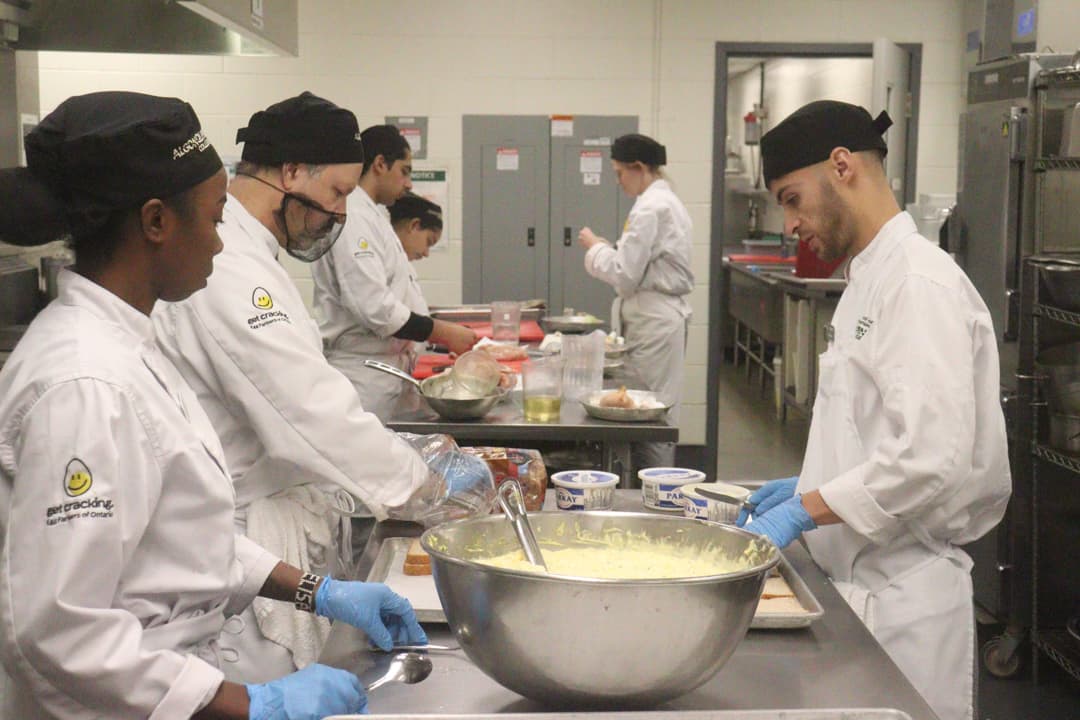Solutions: Culinary students learn to cook mass portions while helping those in need

During their weekly food production classes, Algonquin College culinary management students learn to handle, prepare and serve dishes in bulk.
Half of all dishes produced go to the college’s fine dining restaurant, Restaurant International, and the other half are served to people in need at Shepherds of Good Hope.
The portions bound for the shelter made by just one class can often feed up to 150 people. The college’s culinary program has four production classes where each group makes 150 meals. This means that a lot of hungry people in Ottawa can benefit from their efforts.
Almost two years ago, during the COVID-19 pandemic lockdowns, a partnership between the college’s culinary program was formed with the organization. The shelter had issues with volunteer limits and services necessary to operate their community kitchen. The students were able to step in to help prepare the food.
But what was supposed to be a temporary event has turned into an opportunity that benefits both parties.
Culinary students who make the Shepherds food feel value when doing it.
“I feel good after making the food because of all the people that eat it,” said Preetkamal Kaur, level-two culinary student. “Making different dishes for the first time, I want people to like it.”
“It feels good to combine all the ingredients,” said Kaur.
Kaur wants to open a bakery after she graduates because she loves to bake.
Following the weekly food-making, Shepherds collect Algonquin’s culinary food for their services.
“When Algonquin college students take the time to work with raw ingredients and turn them into nutritious meals, this alleviates pressure of staff and volunteers who can then focus strictly on getting the food on to the plates of those visiting the community kitchen,” said Bernie Forestell, senior communications manager of Shepherds.
“The relationship was mutually beneficial and worked so well, Algonquin started to make it part of their classes. The skill and expertise of the culinary program and it’s student had a direct and immediate impact on the people who visit Shepherds in search of a meal,” he said.
Gordon Richards, kitchen manager at Shepherds agrees.
“With the food Algonquin provides, we’re able to bolster our sandwich numbers, and have a few dinners per week made in a way we don’t, and using ingredients we can’t,” he said. “It has been a great help to us, not only from the meals provided to our service users, but from a stock and food waste/management perspective.”
In addition to operating the largest adult shelter, and the only one in Ottawa for all, Shepherds offers a range of services to those in need and is one of the largest supportive housing providers in Ottawa.
Though not explicitly for those experiencing homelessness, the Shepherds’ community kitchen stands as a vital resource for Ottawa during Canada’s ongoing homeless epidemic –– with 235,000 people experiencing some form of homelessness across Canada, as of 2023 according to Statistics Canada.

With the help of donations and food collaborations, Shepherds supplied 330,000 meals through their community kitchen and housing programs, between 2022 and 2023, according to Forestell.
As a charity organization, Shepherds relies on volunteers and donations from sources across Ottawa – with $8,393,443 donated by the City of Ottawa between 2022 and 2023.
However, the organization is facing challenges too. Shepherds has lost 80 per cent of their volunteer service from the peak of COVID-19. Slowly they are building it back up. But with the rise of food insecurity, they can only help so many. Staff limitations are still an issue. And cooking is usually left to one volunteer or staff, while the rest do daily prep.
The Algonquin culinary program came through for Shepherds in one of their toughest times. But they have also came through for others.
The program reached notable charitable milestones over the years. For instance, in the spring students prepared 950 meals for the Ottawa Food Bank.
Today, the students learn contemporary food production once per week, and are primarily focused on the process behind bulk food production.
“The really nice thing about the students, is that built into our program is their need to cook food in quantity – we make certain we send larger meals to Shepherds of Good Hope,” said Scott Warrick, an Algonquin College culinary management professor.
“They get graded on the quality of the food, the amounts they’re making, and following recipes,” said Warrick. “Instead of making something for twelve, you’re making it for three hundred.”
Detailed information regarding donations, volunteering, and events is available through Shepherds of Good Hope’s official website.








